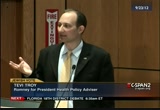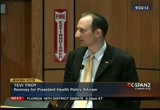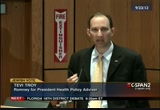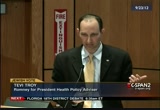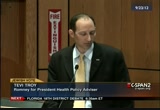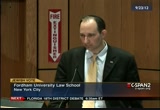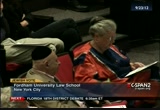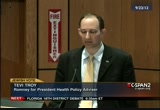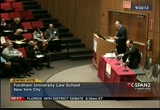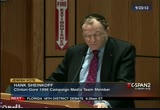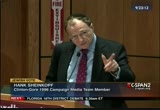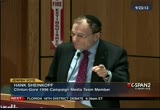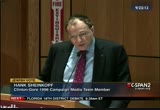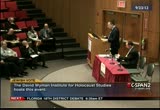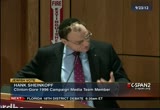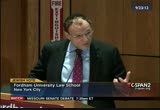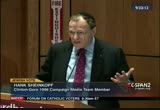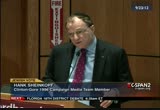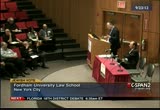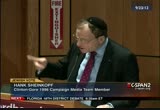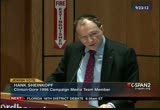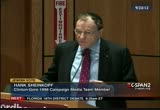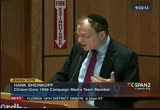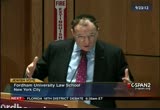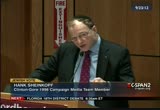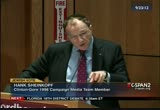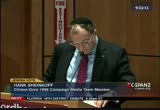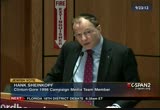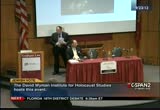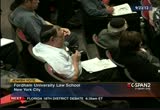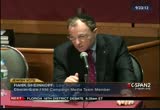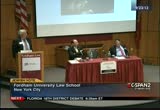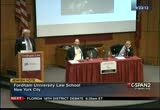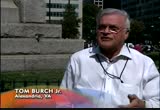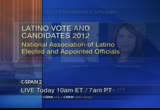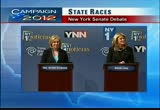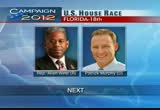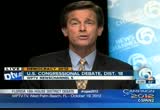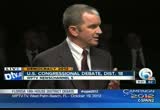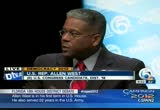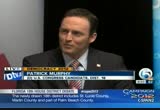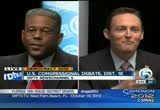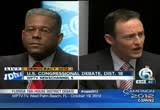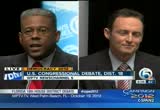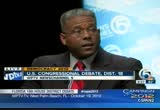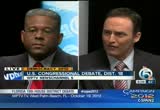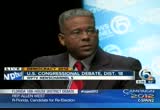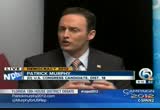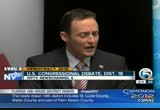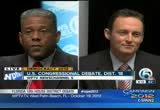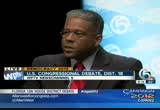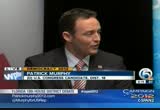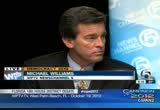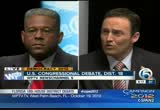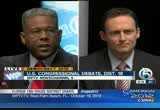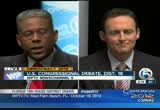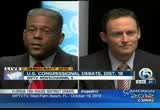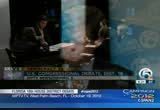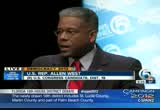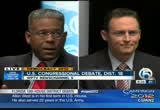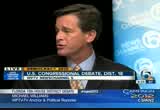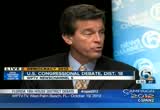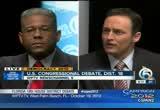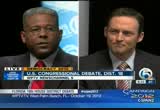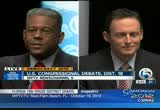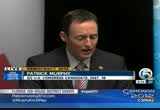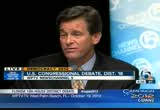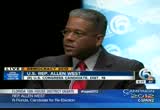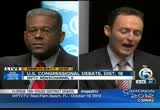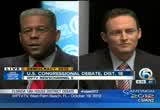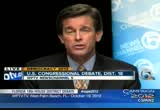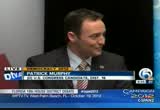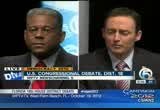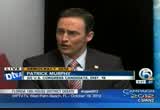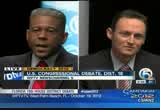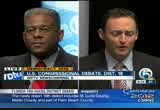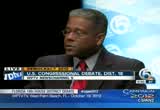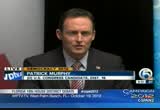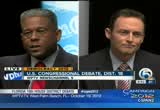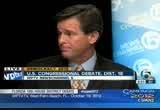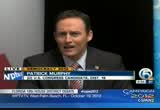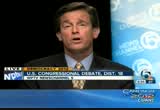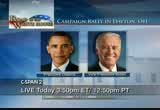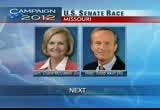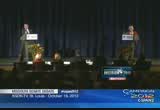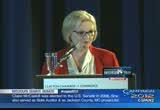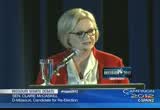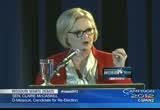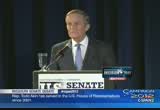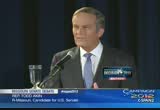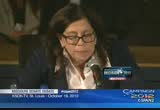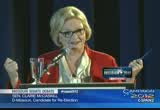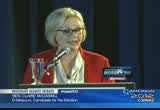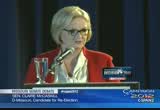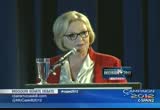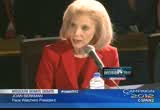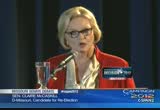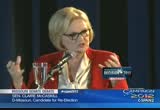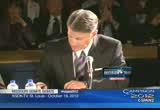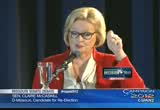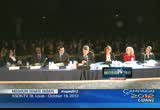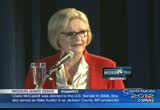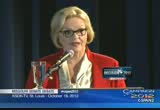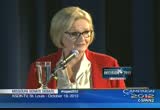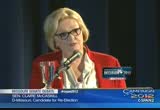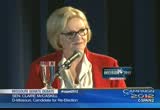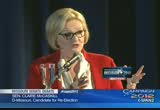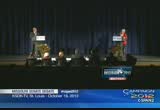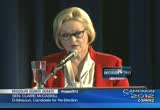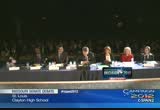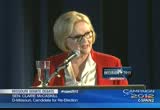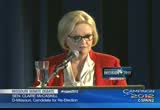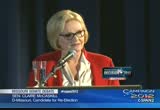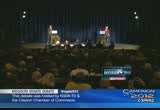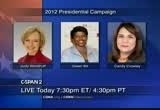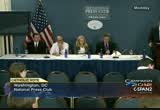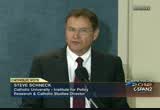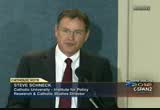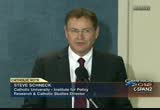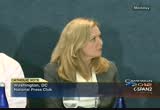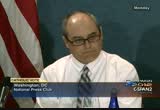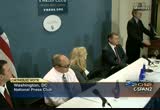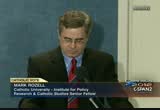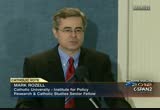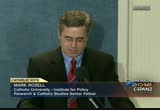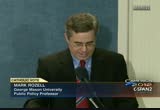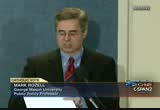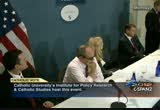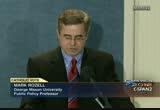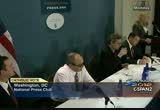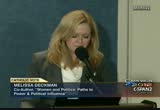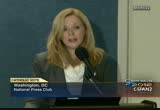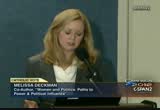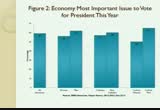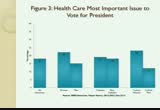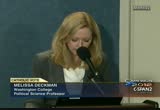tv Today in Washington CSPAN October 23, 2012 6:00am-9:00am EDT
7:00 am
please stay with us. ♪ ♪ >> welcome back to the continuation of her one our prime time live debate for congressional district 18 covering parts of palm beach county, barton county. with us today, congressman allen west and his challenger for the new district here, democrat patrick murphy in its first run for office. we thank you both for being with us. will continue our question on the broad topic of taxes. >> moderator: we left everyone hanging on the deficit. let's pick up without again. you are opposed to raising taxes. the deficit this past year was a think 1.1 coding dollars which was an improvement over the previous year. if you're not going to raise taxes, what are some things you could cut to get anywhere close the erasing of $1.1 trillion
7:01 am
question. west: we are supposed of the deficit cut in half which is 458 billion. we should be about 230 billion but we've had 1.42 trillion, 1.29, 1.1. i think we have to look at certain agencies that were created and are not meeting up to their mission. look at the department of energy that was greeted back what i was a teenager and it was to make united states of america energy independent. so what is happening with the department of energy over these past 37 almost 40 years? we look to the expansion of the government through education. when we separate the department of education at of health education and welfare. what is happening to the status of the education? where 25th yet we've spent more and more money at the department of education level. money that could've been really used better at our local level. i think we have to go surgically and start looking at these wasteful and duplicative programs, look at the quote from
7:02 am
senator tom coburn and we've got to move with him baseline budget 20 base budget. >> one minute response. murphy: the gao had a study that found 33 government agencies that are duplicative that basically to the same thing. we have to streamline these agencies. seven of those agencies are focused on this descent rate. let's bring these agencies, streamline them. we also need to go after waste, fraud, and abuse. we've already attacked medicare fraud and abuse. tens of millions of dollars. need to continue doing this. my background is as a cpa i speak as going into numerous fortune 500 companies looking for efficiency, where we to make companies come in this case government agencies more efficient. i played using my background to find this waste from a follow-up? specint if you give me ideas? >> close to $85 billion. look at the other guy.
7:03 am
never been politics before, and his first three months i found three way so programs under the department of defense budget. i brought those to the house, they passed. combined savings of about 300 some odd million over the course of 10 years, but if every single member of the house of representatives was going in and looking for wasteful programs, think about what that does. tracery look, it's going to be a balanced approach. i've are simply need to go after fraud and abuse the also need to look into the tax code and some of the loopholes. far to me corporations and individuals are getting away with. i'm not saying they're breaking the law, but we need to make him or even and more fair playing field for all companies. and i want to take a quick break. will get to jonathan animal but think it's important because we had some candidates, republican democrat all the time about where we find wasteful spending. i want to throw up a chart.
7:04 am
our viewers at home conceived. you all probably have better vision than i do. you can look into the cameras right there. the jewish national debt, $16 trillion counting. also as you continue to look at that, 3.5 trillion in spending the last fiscal year. a trillion dollars deficit ago talk about programs you can cut but it's clear the three biggest drivers of our dead are medicare, 756 billion, social security at nearly 800 billion defense including the wars we're fighting an 6-under 62 billion. six out of 10 federal dollars. what are the tough choices that you're willing to make when it comes to prioritizing cuts in benefits or cuts in defense? west: under the tea party put people like you in office. so with these three specifically, where do you cut
7:05 am
first? you have one minute to respond to. west: first of all let me correct your something. the 6-under 62 billion ui should include the overseas contingency operations, and so now the we're not out of iraq, you're looking at a guy who voted for the budget control act of 2011. something might oppose that he would not support. that cut, the defense budget by $487 billion over the next 10 years. it's the sequestration i'm against the put another five or six and. 62% of the budget of the united states is net interest on the debt, medicaid medicare. one thing aarp has said stop with the payroll tax cut gimmicks. because we're driving social security into a deficit situation. that's what we have to do. register looking how we can look for, protect and preserve programs like medicare, but also what are we going to do to make sure into sustainable? on the same question to you, mr. murphy.
7:06 am
any real search discussion has to look at the programs like this. if you had to prioritize where does it start? murphy: you can look at these three in a vacuum but you've got to look at -- [inaudible] murphy: they are a definite problem. that's a want to get my background in it because i think i can help a. when you look at you can't look at in a vacuum to each individual department needs to be looked at to find these inefficiencies, i read a report recently that said congress is continuing to approve spending for our military that our generals on the ground do not want. i support everything in defense budget that is going to keep our brave men and women abroad safe. and that's number one priority but when congress is continue to issue programs and approve programs that generals don't want, that doesn't make sense. we need to look at all three departments. medicare, we've gone after the waste and fraud. we have to continue cracking
7:07 am
down and find more examples of this drama and let me ask for follow. harsh things, they don't see the big tough cuts. your household budget look at the biggest item so we've got to make major cuts. neither one of you said which one, defense, medicare social security. if you had to prioritize them, which of those three do you start cutting first? west: i would start cutting on defense. i cut it when i found those wasteful programs. i cut 487 billion over the next 10 years which is something everyone agreed upon. we also have to look at if you want to talk about a balanced approach you've got to look at the mandatory spending side which is 62% that we're not doing anything to. that's we have to the courage to do something about that. the net interest of the debt, so i think when you look at the constitution our preeminent responsibility is to provide commonsense.
7:08 am
we can do it a lot smarter. murphy: again, it's a balanced approach. we need people that are streets about solving problems to people willing to reach across the aisle and find compromise because that's what this is about at the end of the day. first, president obama and john bain, speak of asking to do. films had a grand bargain. but the tea party people like my opponent wouldn't let boehner megadeal. now everything is on the table during these negotiations but the tea party wouldn't let it happen. we are left with the sequestration. we have looming cuts at the end of you that our economy cannot sustain right now. and it's because of tea party, because of the extremism try to the sequestration was president obama's idea, okay? it had nothing to do with the house of representatives. turn one who voted for. west: i did.
7:09 am
i'm taking action. not just rhetoric. spent we are taught not looming cuts that will affect both defense and social programs if they're not ever before the end of you. i think it's a good point to start popping up medicare and health care. your question goes to mr. murphy for one minute. >> mr. murphy, we've seen a lot of different numbers on what the paul ryan plan would do in effect to increase costs potentially to seniors, anywhere from 6003 and $50 under the old plan, different number, to about $200 a month in the new study. what kind of number 10 we look out and say this is what a couple look like because a large area of the budget that needs to be looked at? murphy: that's the kaiser family foundation study referring to that said under their plan 60% of seniors are going to face cost increases. this is something that needs be
7:10 am
addressed and people look out their line plan and look at what's happened to. under the right thing which might opponent voted for twice which would be suicide to oppose, we ended medicare as we know. that's not the way forward. we need to reach across the aisle, do what's best which are medicare is there for generations to come. i was at century village talking to seniors. you could see the fear in their eyes. worrying medicare will be taken away from them. if not then, their kids and grandkids. we need resolution. under the affordable care act they found inefficiencies and waste and fraud and to put that money, they've taken it away from insurance company executives away from the pharmaceuticals and given it back to seniors in the form of preventative treatments come in the form of closing the total. this is what we need to do to start bring down the long-term costs are that a strike our health care costs through the roof. drama and mr. murphy, we like congressman west to answer that question. west: when you look at this whole thing about indie medicare as we know, that was already
7:11 am
debunked. medicare as we know if you have not paid attention to the actuaries and trustees in since 124. social security in so nine years after that. so we need to step up. continue to do nothing and no one will have nothing about what is now. agreement support when the paul ryan has proposed, it's something that came from bill clinton and his administration. it provide you the exact same type of health care plans that we're able to select as a government employee. if you're making less you get more. if you're more so, you get more. but what you see with the affordable care act, think about the mandate but just in than two weeks ago where seniors if they return back to hospital within a 30 day visit, the hospital gets a fun. that's not the right way to take care for seniors. you talk about -- turn one we
7:12 am
have to stop. first we're going to stay on the topic but george will begin the cycle with you going to congressman west. >> sticking on medicare, when he ran it two years ago you campaigned against the effort will care act and its cutting, or savings or cost reductions of seven under $16 billion for medicare into been very critical of that. when you voted for the wine plan also includes 716 billion in savings to what is the difference between the one you criticize them what you voted for? west: i have not voted to get $716 billion from medicare. what i have voted against a lot of owners policy, 3% withholding tax, medical loss ratio. when you look at the affordable care act it's very simple. it's a tax law. the our 20 taxes in the affordable care act. now we find that the individual mandate is now a tax. your taxes on capital gains, taxes on dividends, risky transaction tax.
7:13 am
medical device tax. health savings account which recruit for people to be able to earmark a certain amount of income and not be taxed is not taxed. what you get with the new taxes with 159 new government agencies and bureaucracies and you also get 16,000 new irs agent who will be monitoring electronic medical records. that's not how we repair health care. as you well know, i wrote an op-ed piece talking about free market solutions to our health care to restore and get back on track. one of those key things, toward reform. -- toward reform. murphy: when you voted for the wind when you voted to take the $716 billion, and -- [talking over each other] murphy: you said you wanted, i voted from seven to $16 billion. it says voter. the fact is i've never been in congress.
7:14 am
[talking over each other] murphy: let's be clear. in the seven of $16 billion, its future savings under the democratic version. what they did is they found waste, fraud, and abuse. they found some overpayments to insurance companies that they are now getting back to seniors. through preventive treatment, anal screenings and by closing the don't overseas. seniors love this. the difference is the $716 billion in your plan, which you voted for and paul ryan thought it was a good idea to include in his plan. the difference is that seven and $16 billion goes to giving tax breaks to millionaires and billionaires, ghost in insurance companies and executives bonuses and heists hours because a big difference when it comes to seven and 16 billion. west: the point is this, the affordable care act with route will be metaphorically and is now 1.7 trillion. we are seeing an increase of 17% and in insurance premiums chicago talk to health underwriters? these are those independent
7:15 am
insurance agents which what you're talking about is being driven out of business. you are forcing more business to larger insurance companies. murphy: i did speak to the aarp and they don't like your plan. they don't like the rhineland. they didn't endorse. let's talk about the seniors who are being affected here. with the affordable care act we've added eight years of life to medicare. [talking over each other] murphy: is a step in the right direction. we have to make the steps and continue to improve. that's where the conversation can be. the affordable care act was not perfect but no piece of legislation that comes out of washington perfect so it's focused on how to improve going forward. >> moderator: a conversation with a continued after the debate. tran went back now with our
7:16 am
congressional debate in district 18 covering parts of palm beach county and saint lucci counties between congressman alan west and patrick murphy, the democrat. jonathan has come your question for the congressman. >> the newest paul ryan plan has an option to continue in a normal medicare plan. explain how that's possible given we're talking at how much cost we are associated with this program that we need to get trained to i think that if you allow people to the options to go, whether they want to have their own health insurance plan that they will go or do go into medicare plan, eventually it does end up in the cost of the overall medicare. this country be about having options. when i became a congressman, guess what? i have options to health care program that i wanted to. i chose blue cross blue shield an ongoing thing for the. i think that the options we ought to be able to present.
7:17 am
it's also like we said indexed toward income. if you are a highway journey you're not going to get the same amount of money as someone that is a lower wage earner. so i think in the long run what we are talking that is exactly what everyone is saying. all this about fairness and all this about those who are higher wage earners not getting the same as others. i think another thing is raising the cap on social security, raising the age as well. there is very good proposals. murphy: it's back to the same. under divine plan which congressman west voted for, we in medicare as we know it. this is a serious issue. [talking over each other] murphy: look, i talk to seniors every day and they are scared, they're worth. i see the year in their eyes. i agree we need to make tough decisions but we need to continue to find ways to make these programs more efficient. and i believe that when you give it to the private sector, i
7:18 am
don't believe this is a fact, there's a profit incentive. it's competitive. [talking over each other] murphy: not from small businesses, but when it comes to medicare, when it comes to giving businesses -- benefits to individuals they deserve the best we can. they do need someone skimming off a profit and sellers but right now in a medicare when you compare it to some private insurance company, their costs are way lower than his private insurance companies. what we have is working but we need to make more efficient and we need to continue improving the system we have. >> moderator: a brief follow-up. who could make it more efficient, private business or -- west: that's part of a free market. that's what made this country what it is. when you talk about seniors being afraid, one of the main recently seniors are being afraid is their doctors that are dropping them off of medicare coverage because the reimbursable rates are getting cut and cut and cut. that's a big concern for our seniors.
7:19 am
murphy: look, it's about the beneficiaries, it's about those waiting to get the street with. i think this conversation of a focus on how we can look forward, how can we improve the. i think there's a proposal i would like to put forward is to allow our government to start negotiating with large pharmaceutical companies. let them negotiate to bring down these calls. also we need to move can't continue to move towards a method of pay for performance for doctors, not just pay for individual treatment. this will help bring down the long-term cost. when it comes to health care it's all about cost. >> moderator: all of which is still begs the question of how do we afford it. outline your views on abortion and gay rights. mr. murphy first. murphy: i support a woman's right to choose. this isn't a were my opponent and i on two opposite ends of
7:20 am
the spectrum. congressman west said planned parenthood women are neutering american men and bring this country to the point of incredible weakness. i could not disagree more with that statement. congressman west voted to the fund preventative treatment for women, things like mammograms, cosponsored congressman akin bill. also voted for the person at a minute. they should make all abortions illegal even in the case of rape or incest. i do not support the. i support a woman's right to choose. when it comes to marriage equality i'm there. i support marriage equality. west: i have two daughters. this is the standing and the west housel. we don't support abortion as a means of birth control. as far as rape, incest and health of the mother. but i do not support or shall birth abortion but i do not support when president obama supports a child surviving an abortion will still be killed. that's infanticide i go back to his record of state senator. planned parenthood is a billion
7:21 am
dollars not-for-profit company that's been making a profit. $352 million the federal government since to planned parenthood, i think i'll become that could get a place. one of the place i think it should go to is helping us with comprehensive everglades restoration project. helping us to make sure that our waterways and water quality is going to that's what we should be prioritizing taxpayer money. murphy: look, planned parenthood treats all sorts of women. women in the that need preventative treatment. that's where the money is going so not going to take way that funding for the preventative treatments. it's interesting how you slid environmental issues into the answer when you voted to allow oil drilling in the everglades. i couldn't be more out of touch and that -- [talking over each other] treachery i have the vote. [talking over each other] transferred a big part of this district is environment and so much of our economy local is
7:22 am
based on our environment. there's a direct correlation whether its tourism, real estate, these days of economy -- west: michele bachmann came down here and so that i did and as was all over like a black eye on a piece i guess you got this very wrong. once again, i'm talking about priorities. and when you look at what is happening with planned parenthood perhaps you should call secretary sebelius. hhs came out today and said planned parenthood is not doing mammograms. >> moderator: we have to move along to the final question to be all time to close. george, your question first. >> this race, both the guys who spent a lot of money, one of the costliest congressional races in the country. outside groups have spent more than $3 million. do you support any kind of legislation that would limit the influence of outside groups? is that necessary? west: first of all that has to be argued in front of the supreme court. the supreme court made the decision. look communism if you look at
7:23 am
our record, our record shows an incredible amount almost than 5% from individual donors. nothing is really the averages about 98, $99. i can't help it that people are going to donate to me. if outside groups, though some people that are pledged to put about $5 million in tax against the. so be it. i know that my opponents that even created a packed specifically just support them. that was pretty me. i don't have a gold tooth as you can see i don't like punching women. but i think that needs to be gone back and argue before the supreme court. murphy: to answer your question, absolutely we need major campaign finance reform in this country. coming from the private sector campaign is seeing what's happened our country because of the money in politics is absolutely gross. i'm completely against the i want series finance reform. it starts with a constitutional amendment to overturn citizens united. he has a $1 million super
7:24 am
package supporting it. this isn't just talk and made a facts. there's a $1 million super pac supporting congressman west. the person behind this pact is a pharmaceutical drug company owned or. you wonder why congressman west doesn't want to look at them negotiate with pharmaceutical companies. it's all about where your priorities are and where this money is coming from. west: let me say this but if you go back and look at the record, look what president obama was negotiating with pharmaceutical companies with the affordable care act. >> if you overturn citizens united in what was the shape of that legislation be? both of you outside facts that are supporting you your what legislation or constitutional amendment you support? transferred to completely overturn citizens yet. i don't support it at all. its gross was happening in a country. individuals and corporations can give unlimited amounts of money to campaigns is not right. that's not what our country is about. west: i think what you can do something that should be argued in front of the supreme court,
7:25 am
and that's not something that a think we should be taking up in the legislation. there are much war important topics we need to be focused on like the tax fiscal cliff. >> moderator: very briefly. quick question. takes a simple answer. do you apologize to the nastiness of your campaign ads and do you? as you look each other in the eye. trying to i don't know what nastiness we're talking about. let me tell you something. no one came out and said anything about last cycle and associativity numbers was put out. george asked me a question about me being the only black member -- >> moderator: no apology. what about you? do you apologize for the nastiness? traffic i talk to people everyday and they're tired of the -- all of our ads, our actor. we don't have to -- that's not my ad, sir. all might ads out of my campaign are factual. those are quotes. i do need is being anything. >> moderator: we will go to closing statements.
7:26 am
first by agreement, congressman west, one minute thank you very some. i'm proud of the record with establish in washington, d.c. my opponent talks about -- when i look in study the constitution of the united states america our country was established on a government our country was established on fiscal responsibility. individual sovereignty. a thriving market. that's been the essence of what i've done being a member of the armed service committee and also being a member of the small business committee. i'm kind of upset we didn't get a chance to talk about our foreign policy our national security standing that we see which is very threatening. we didn't talk about our belief in how we improve our military. how we match we take care of our veterans. but that's my commitment to this country, a commitment that i've done for 22 years in uniform, a commitment i take very serious. we have the right type of reforms make sure this country has a better and brighter future. murphy: thank you, everybody come and thank you, congressman. we have a representatives more
7:27 am
focus on job creation, not headlines. i believe my background and cpn small business owner takes as fact what we need to per country back on track. i'm going to focus on protecting our seniors and strengthen the pillars of the middle class. is put social security, medicare and medicaid. not constantly demonizing them and attempting to privatize them. my opponent called 80 members of congress communist. voted the and medicare. voted to andy pilgrim summer students and supported legislation that would take away a woman's right to choose. palm beach post even said he is everything that is wrong with congress. the fact is i'm a former republican. i got tired of the extremism that's great gridlock in the country. i'm a moderate and i the background to get a country back on track. not only do we need to get to work, we need to work together. thank you. >> moderator: we thank you both for being here. we thank george bennett and
7:28 am
jonathan, most of all we thank you, congressman west brought up an interesting point. we knew we could would begin to scratch the surface in this hour-long debate at the only televised debate that the two candidates agree to. when you monday night would be a huge foreign policy only debate at lynn university, and that largely we suspect they largely support the two respective candidates. president barack obama in mid-run for cover the ground there, so we elected to move on without the. we hope we have waited your appetite to learn more about the candidates before election day. on behalf of their but here at wpp the news channel five, we wish you and yours the very best. thank you for taking time to join us, and good night.
7:29 am
>> when i watch c-span, i particularly like the congressional hearings, sometimes he had the hearings on pieces of legislation before poorly care the house of representatives when they have their proceedings. i have found the congressional hearing coverage articulate interest on subjects like the subject matter like something do with veterans affairs or procreation. you get an idea if this is of public interest but you want to get c-span as we can actually listen to live test of the usually in an hour to you can get the raw data. >> he watches c-span on comcast. c-span, created by america's cable companies in 1979, brought you as a public service by your television provider. >> today, one day after the final presidential debate, the candidates are back on the campaign trail. president obama and vice
7:30 am
president biden start a two-day, six state tour with a rally in dayton, ohio. live coverage here on c-span2. later can we join republican presidential nominee mitt romney and his running mate, congressman paul ryan for a campaign rally in colorado. see it live starting at 9:05 p.m. eastern here on c-span2. >> it's time now for our lightning round. we're going to ask questions that can questions that can only be answered with the words yes or no by the candidates. we'll ask both candidates to refrain from explanations or maybe anything except a yes or no. >> senator, would you like --.com or going to be starting with you, forgive me. would like to be if elected senate majority leader? >> would i like to be senate majority leader? sure. [laughter] >> senator?
7:31 am
>> yes. spent in islam, have you fire a gun or rifle within the last year? >> yes. >> senator? >> no. >> is andrew cuomo the best new york governor in your lifetime? >> no. >> senator? >> i'm going to say his term is not finished but his father was. [laughter] >> very good. ms. long, have you read and "fifty shades of grey"? [laughter] >> no. >> me neither for the record. [laughter] >> ms. long -- >> this month leading up to election day, followed the key house senate and governors races on c-span, c-span radio and i cspan.org/campaign2012. >> up next, the missouri senate debate between democratic senator claire mccaskill and republican challenger congressman todd akin.
7:32 am
cook political report writes this race as likely democratic. this debate courtesy of ksdk-tv in st. louis is just under an hour. >> and good evening and welcome to the clayton chamber of commerce debate. and i will be your moderator for this evening. first we need to thank our presenting event sponsor, the law firm of hush blackwell and the media sponsors. ksdk news channel five, st. louis public raider, and the st. louis business journal. ksdk is televising this broadcast live to its affiliates across missouri. kansas city, springfield, and columbia. and st. louis public radio is doing the same.
7:33 am
the broadcast is being streamed live on ksdk.com. we also invite you to take part on social media. our hash tag on twitter is mosen. before we begin i like to review the debate format. each candidate will get a three minute opening statement and a three minute closing statement. next our panel of media sponsors, chamber and school district representative will ask questions of the candidates. both candidates will respond to the same question and have one and a half minutes to do so. rebuttals will be at the discretion of the moderator and will last 45 seconds. after that we will take questions from the audience who received an index card as they entered the auditorium this evening. they are asked to print the questions out and i will pose
7:34 am
those questions as long as time permits. let me introduce artificial timekeeper, rose, assistant vice chancellor of government and community relations of washington university. rose, please hit the green light. this indicates that the time is officially begun for a candidate to respond. when 30 seconds remain, both the green and yellow light will appear. and when 10 seconds remain, the yellow light will come on. and when time is up there will be a red light and we will half to cut the speaker off. the audience in the hall has agreed to be polite and attentive, no cheering or booing or outbursts of any sort. we will set aside that agreement just this once. ladies and gentlemen, on behalf of the clayton chamber of commerce and our event sponsor, please welcome senator claire mccaskill and congressman todd akin. [cheers and applause]
7:35 am
>> moderator: now, a going to ask what held last week to decide who would make first opening statement. having won the coin toss, congressman akin has decided to go second, so senator mccaskill county of three minutes to deliver your opening statement treasury thank you for the sponsors of the debate, to congressman akin for being here, i know the ideas is not supposed to make any noises, but if people could hold up thinkers, the cardinal scored during the debate, that would be great. if you're watching this at home, having take a, i completely. it is great to be here and great to have a debate about some very important issues that missourians face. i went to washington, d.c. as an otter and a prosecutor. to solve problems to missouri's families, and to hold government accountable to taxpayers. i knew it would take a couple of things. it would take some hard work.
7:36 am
it would take compromise, it would take a willingness to work across the aisle with my republican colleagues. i rolled up my sleeves here first, earmarks. i had no idea how ugly the air marking process was until i got there. a favor factory, lobbyists, campaign donations. i said i'm not going to play this game. we should spend public money based on merit, not based on who you know or who you are helping a. so i never asked for an earmark. and i went to work with republican senators mccain and demands another republican colleagues. against the majority of my party and we banned it marked the i'm proud that were. congressman akin has requested hundreds of earmarks. until they raise alee a proud defender of in marking process think it was a constitutional principle. then there was contracting. as a prosecutor i looked up the government contracting company can't come a i look at what's
7:37 am
happening in iraq and afghanistan with abusive wasteful contracts. once again, working with both democrats and republicans were able to move across government and really reform some of these bureaucracies that were wasting your money through wasteful contracting practices. and then suggest sessions a couple years ago came to me very conservative republican senator from alabama and said you seem like the kind of democrat that would work with me on putting a cap on federal spending. and i said i am the kind of democrat. together, even though my party's leadership thought to me, we worked to put a cap on federal spending. i think our legislation made a difference. a strong bipartisan record. it is much different than congressman akin's record. congressman akin has been one of the handful of congressmen voting against the mainstream programs, a very extreme right. he wants to privatize medicare, abolish the minimum wage, he wants to to say that rape
7:38 am
victims cannot get contraception or an emergency basis. he wants to say that we have no more student loans in the federal system. he wants to, in fact, privatize social security. and he even says that the boss has the right to discriminate against you if you're a woman. he says that's freedom. i say that's unfair. moderate versus conservative, moderate versus extreme. i think there's a very big choice for missourians to make. >> moderator: thank you, center. congressman akin come just three minutes trying to thank you all for being here at for making the debate possible. i'm an engineer come served as an army officer, worked for ibm were i met my wife of 37 years. we've been blessed with six children, eight grandchildren. three of my children were at the naval academy and became marines. one is in the mediterranean serving to do. i'm particularly plus also
7:39 am
tonight that my parents a way here with us, dad is 91, served with patton in world war ii. and my mother, we talk to into cooking dinner for us sunday night. i think we're all here because we want an america with a bright and cheerful hope for the future. but that could future that we want has to come with right choices and wise decisions. unfortunately claire mccaskill and barack obama have not given us such a future. claire mccaskill was the first to endorse barack obama, and she was his strong right hand passing legislation, voting with them 98% of the time. and what exactly does that record look like? first of all, in the area jobs, instead of the promises from the $787 billion stimulus bill, we have 43 months of the worst unemployed since the great depression. deficits, we were promised that deficits would be cut in half
7:40 am
and they have been triple. we are awful a factor of six. energy, the obama-mccaskill record, the funding of solyndra, the epa given the power to shut down the coal industry. and, of course, stopping drilling and the keystone pipeline and gasoline prices have doubled. health care, is even worse. 71% of us in missouri voted against the government takeover of health care, and claire mccaskill right after that voted to pass it. there's a reason for this record of failures and that's because obama and mccaskill have a deep and abiding faith that deep, is the solution to every problem. and that's why they couldn't fulfill the records. claire is going to washington, d.c. and she is brought us red tape and taxes and all kinds of bureaucracy, and executive orders. she doesn't understand that these big government solutions chilcot freedom.
7:41 am
now, what i would suggest is that you could bring me to washington, d.c. in the senate so that we could take the missouri commonsense back to washington, d.c. and not a lot of bureaucracy. cut down the taxes and the red tape and the bureaucracy and build an american dream and build of the american family once again and be strong and restore a bright hope for our future. thank you very much. i look forward to join you in the rest of the debate. >> moderator: thank you. next we turn to our panelists for the questions of the candidates. ellen sherberg, publisher of the st. louis business journal, will post the first question, and your question goes to congressman akin will have one and half minutes to respond. >> congressman akin, just today, the heads of goldman sachs, bank of america, citigroup, and many of the financial, major financial institutions sent a
7:42 am
letter urging the president and congress to avoid the looming tax hikes and spending cuts that we call the fiscal cliff. widget your stated positions are you willing to compromise to break this budget gridlock? please be specific. akin: what you're talking about is january 1, 2013, some people collect taxmageddon, and we are facing quite a number of problems all at once. first of all, there's the problem of the sequestration, another 10% cut to defense, the largest tax increase in the history of the country. all of these things both a lot of challenges. and i think that's a solution to these problems has to be done in a couple of things. first, you have to reduce the size of the federal government. and the sick and you have to do is get going. you can't do it with just do one
7:43 am
or the other. the best way to get the private sector going, there's really two steps to them. the first thing there is to get the red tape under control. they're driving our business efficiency down and pulling people and driving jobs overseas. the second thing is we've got high unemployment and yet we've got the highest corporate tax rates in the world. that doesn't make sense. so we need to reduce the corporate tax rate. and so accommodation of those things come you've got to reduce the size of the federal, spending and then he got to take care of the red tape and reduce the taxes. you put that together and you've got to hope a record of time putting the budget under control. >> moderator: thank you. senator mccaskill, your response transit i'm not sure i heard anything is going to compromise about. i've been part of a group in the senate, democrats and republicans, that a been working together to try to hammer out this compromise. there's a lot of provisions of the in quote unquote scored by
7:44 am
the congressional budget office so we know what we need to do. we need to get to a four or $5 trillion reduction in our long-term debt over the next 10 years. the simpson-bowles proposal have a lot of things in it that were worthy of our discussion and consideration. i want to look at pieces of simpson-bowles and there are pieces that we are called the moderates and their some democrats and their some republicans, and that's the hope of fixing this problem. the hope is not on -- the hope is in the middle. where we with take a balanced approach to i'm going to compromise and lower the corporate rate. but we have to have some revenue. not just cutting the size of government. i'm for the. i talked about that in my opening. also cutting the spending in government. may be doing some means testing the i'm not sure we need to be buying donald trump's prescription drugs. this combination of things is how we can get to the compromise to we're not going to get there
7:45 am
by being at opposite ends in shouting at each other. i think we can do it in the senate through the moderate middle. >> moderator: thank you. next, a question to senator mccaskill and you have one and half minutes to respond. >> senator, what with the national press say about missouri voters if your opponent is elected? mccaskill: you know, i don't really care. it's not something i worry about what the national press says. i'm more worried about the people here in this state and the problems they face. i was a single mom for a long time with three young kids. i know what it's like to wait and pick up your dry cleaning until you get your next paycheck. and that's what i'm focused on. i think that this preoccupation with what the press is saying in the horserace, i want to get to work and help missourians. i want to make sure we have student loans.
7:46 am
i want to make sure we have social security and medicare. i want to make sure that people can rely on the minimum wage but i want to make sure that the workplace is fair. and so, i'm honestly not that concerned. i will be honest with you, if i lose this race i will hate it because i want our government to reflect our values. i want our government to reflect our best hopes and dreams. and i think congressman akin's view is very narrow and leaves a lot of people out. and so i would be sad, but i always trust the voters. i respect whatever decision they make but i could care less about the national press. >> moderator: congressman? akin: well, you know, it seems to me, i've had a chance to travel for 18 months around the state of missouri, and i have a pretty good sense of where people are. if you're in a question of where we were about a government takeover of health care, called
7:47 am
obamnicare, 71% of the people have already voted on act. and if you take a look at some of the other things are important to the citizens of missouri, the idea about the fact wind blow jobs and have a record what we have 43 months of the worst job record since the great depression, people care about the second amendment and the constitution in the state of missouri. my record is clear in the. i support the second amendment. i support the constitution. i didn't support the president bombing libya without constitutional authorization, and it seems to me as i've had a chance to travel, my views are very much in sync with the voters of this state. and what's more, i suppose the failed record and the failed policies which have given us the unemployment, the lack of jobs and the other miscellaneous problems such as gasoline prices doubling. so i think my views are consistent with people of missouri, and i believe that they will reelect -- they would
7:48 am
elect me to the us congress. >> moderator: would you like a rebuttal? transit i don't think so. >> moderator: chris mcdaniel is a political reporter of st. louis public rita. he will now ask the next question to congressman akin who will have one and half minutes to respond. >> the federal wind production tax credit has been in place for 20 years. but it set to expire at the end of issue. some groups estimate up to 2000 missouri jobs are supported by this credit. will you vote to renew it, and what role do you see for wind and other renewable energy industries of missouri's economy? akin: look, i think the approach we should take on energy first of all it's about an energy energy policy. i think the energy sources should compete with each other. and the approach we've been taking doesn't work. in terms of wind, i'm happy with it to compete with solar cells, compete with coal, oil, gas, nuclear. and let these different sources of energy's work on their own.
7:49 am
now, the fact is that we really haven't been developing energy the way we should. if you think about america, it's pretty amazing. we have an unlimited almost supply of coal, natural gas and oil. and while we're sitting on all of these resources, yet we haven't developed them. why? the reason is because of big government. all kinds of rules and regulations that don't allow us to do the things we should be doing. and what's the cost? our gasoline prices have doubled. if we continue with the policy to shut down the coal industry, as barack obama has told us he's going to do, and claire mccaskill voted to give him the power to regulate carbon, then our elected prices go well. so what we have to do is to take the blessings that we have in america, use them wisely and allow these different forms of energy to compete with each other and let the citizens make the choices, what kind in what they want to get their energy. >> moderator: congressman thank you.
7:50 am
transfer we have a disagreement. he does not believe we should be encouraging subsidies or investments or credits to any kind of alternative energy. on the other hand, ironically, he is perfectly willing to do whatever it takes to protect big oil subsidies. and all of their goodies they get at the expense of the american taxpayer. keep in mind that big oil are the most profitable corporations in history of the planet. the book about $32 billion in profit a year. not the small independent guys, the big guys. we have tried time and time again to say let's start getting big oil corporate welfare at the expense of the american taxpayer. and every time the republicans keep locking. he will not support home-grown energy with subsidies, but he does anything to protect the goal. i have it the other way around. i think we need to be supporting alternative energy, including
7:51 am
wind, solar. we need all of it. i support the keystone pipeline, different than president obama. i support fronting as long as we're doing it safely. i support wind, solar, all of that. i don't support continuing to get taxpayer handouts to big oil. >> moderator: would you like a rebuttal? akin: look, i think it's interesting, i would like a rebuttal, yes, but i think it's interesting that claire talks of being a moderate and effective she is worried about the spending and taxes and all, and yet i believe she supported $6.9 billion, trillion dollars worth of deficit spending, and she calls herself a moderate but i guess the thing that comes to my mind is how much do you have to spend to become a liberal? >> moderator: senator? mccaskill: i want to say this to congressman akin has been a lot of his time in the campaign talking of stingers and other
7:52 am
things he has his whistle but if you look at the record, the interesting thing about it is congressman akin has only opposed the stimulus it is a democrat in the white house. because many times there were $400,000 in stimulus. he has voted for when president bush was president. three different times. december 20, $2,156,000,000,000 in this package. march 7, 2002, $108 billion stimulus project at february 7, 2008, 145 billion stimulus project. and a lot of deficit spending. during the bush years that's when they blew the clinton surplus and congressman akin was right there asking for mrx. >> moderator: thank you, senator. next, joan berkman, represent the claim chamber will ask a question to senator mccaskill. >> senator mccaskill, the chamber represents a large number of small businesses who have had to make difficult decisions like a cutting their
7:53 am
labor force, holding and reducing their salaries, and cutting back on expenses during the recent economic crisis. it's clear that most governmental organizations did not make the same decisions, evidenced by a growing federal deficits and several states and communities are now bankrupt. do you have a real plan to encourage all governments, especially the federal government, to cut back on expenses? mccaskill: we have actually shed a lot of public sector jobs through this very difficult economic time. both local and state, and finally with we are beginning to shed federal jobs. it's not just federal employees we have to shed because if we just put an artificial lid on employees, the government might do what they did during the bush years and that is to then conduct everything. not just buying services, not just buying stuff but buying services. so that's why i supported a federal cap on spending. that's why i am number 50 on the liberal conservatives because i have worked to bring down federal spending.
7:54 am
is very, very important but i also think it's important to fight regulations for small businesses and tax -- cut taxes for small business. the same as home builders came to me and said you're not going to believe this, they will put a new rule on those right winner businesses are in the tank in the housing crisis. can you help us with this regulation fair proposing? i went to work and we stopped. they wanted an unreason safety requirements of our home builders during the most economic, the most difficult time in the economy for them. so commonsense in terms of making sure regulations don't go into place they go too far, keeping protections of small businesses for tax cuts and continuing to have the discipline to spend less money in the federal government. akin: boy, i should understand what it's like for small businesses because they are coming down to my office in droves as a congressman. and each particular group of different kinds of businesses
7:55 am
all have the same story. the only thing that changes is the particular federal agency that is giving them a hard time. and everybody has the same story. over the last number of years they say, it feels to us as though the federal government is trying to destroy us. they are our enemies but it's not just a matter of safety rules. it's these inspectors that, and no matter what you do they're going to find more things wrong with you, to the point that businesses are telling me that they are intentionally leaving some things for the inspectors to find because they know they're going to get hit with a fine, no matter what. so we have created an environment that is toxic for business. we have radical deficit spending. we have a federal government out of control with the amount of red tape and things they are imposing on businesses, and we wonder, and a high, high tax rate and we wonder why we don't have any jobs, by the jobs are
7:56 am
being chased overseas. the talk is fine, but the fact of the matter is that the unemployment and the deficit and the whole situation with the economy speaks for itself. it's not working. and big government is not the solution. >> moderator: thank you, congressman. our next question will be posed by meredith mcmahon of clayton high school. she is the senior coeditor of the globe newsmagazine, and there to accomplish or ask a question to congressman akin. >> congressman akin, when you speak about her commitment to improving public school education in missouri, especially given educational choices you have made for your own children? i am referring to congressman akin's decision to homeschool his children. and senator mccaskill's decision to send at least one of her children to private catholic schools. akin: thank you for the question. all of us understand that education is absolutely critical. one of the things we have in
7:57 am
america is something we call freedom. and people can choose to educate the way they want. and i think we need to preserve that freedom. and one of the things that i've done that not another congressman in the state of missouri was willing to do was to vote no on no child left behind but it's not that i want to leave children behind. it's that i don't have a abiding faith in big government to fix problems in education. and even though the president offered ago, i voted no because i don't think big bureaucrats generating red tape in washington, d.c. help our schools. and so i was willing to stand on the basis of principle that education needs to be local. do you know what makes the best education? it's when you have a mom and dad the other kid and put a high priority on education. and with the kind of formula, education could work well for people. so i've always supported the freedom for people to choose the kind of education that they want, i don't believe the
7:58 am
answers to fixing our schools in missouri have any, can be helped in any way by the large bureaucracy of the federal government. so i'm even encouraged we can save a lot of money and get rid of a lot of the educational bureaucracy because it doesn't really contribute to our education. thank you to transcend senator mccaskill, your response traffic i'm so grateful to my public education. all through school and undergraduate and law school, a proud graduate of the university of missouri, and that allowed me to be who i am today. and for our country, it allows us to be the beacon on the hill. the other countries of the world look to our country for our emphasis on public education and particularly higher education. congressman akin has been very clear. he wants the federal government completely out of education. no more department of education, no more school lunch program. and even it's harder to understand, do away with pell grants, do away with all
7:59 am
federally backed student loans. he said private banks should do it. i don't know very many private banks that will lend money to a 17 year old. 300,000 young people in missouri are attending college as a federally backed student loan or pell grant is helping them. that was me. i had a federally backed student loan but i couldn't have gotten through law school without a. i had to wait tables in addition to the loan. it took me eight years to pay it back, but i pay back every time, emotion people do. we have to leave that door of opportunity open. it is not third stage of cancer. the federal governments involved in public education is important for our country. this is not about bureaucracy. it's about whether or not the middle-class survives. it is a huge difference between congressman akin and me. thank you i'd like to have -- >> moderator: you have 45 seconds. akin: thank you. i think this is a great
8:00 am
illustration of the principal i was just talking about. i've talked about maybe because the fact that we are a trillion and a half overspending in federal government, a massive amount, maybe we need to link the stands and i suggested maybe the school lunch program could be shifted to the state. i don't know whether the lunch taste as good as the state has as one of the federal government does about claire mccaskill seems to think this is a crisis if you don't have everything done by the federal government. just a year or two ago there were student loans that were made by private lending institutions. obamnicare changed all of that. and you have to be against college in student loans to suggest we don't have the federal government doing all of that for us? i think not. ..
8:01 am
mccaskill: allow kids to get the loans directly from the schools. but what congressman akin has said is that the federal backing of those loans is a problem, and if that federal backing is not there, the private banks will not be making the loans. >> moderator: senator, thank you. we now need to proceed to our next segment of the program with questions from the audience, and the first question will be directed to senator mccaskill, you'll go first and have one and a half minutes. i was born in mexico and immigrated since the age of 4. if you are reelected, senator, or if you become a senator, congressman, how will you influence these policies and their related factors?
8:02 am
mccaskill: first, we are a nation of immigrants, but i'm a former prosecutor, and i do believe very much in enforcing the law, and i don't think anybody should be allowed to jump the line by breaking the law. so i believe it's very important we enforce those laws, particularly those employers who knowingly hire illegal imgrants. that's the -- immigrants, that's the magnet. i asked how many employers have you prosecuted for knowingly hiring illegal immigrants, taking advantage of them, cheating, not allowing their competitors to have an even playing field. and you know what? they didn't even know. they hadn't emphasized that. we have turned that corner, and now you're beginning to see a drop in illegal immigration, and part of it is because we're enforcing it with employers. on the other hand, we should be stapling a green card to any student in this country who wants to stay here, we should be stapling a green card to their
8:03 am
college diploma. we need them in this country. and finally, if you're young, a child and you have been brought here through no fault of your own, i believe what the bible says, the sins of the father should not be ascribed to the child. and that's why i did support the dream act, another difference between me and congressman akin. >> moderator: senator, thank you. congressman, your response. akin: well, all us at one time or another, our parents were immigrants to this land as well. and one of the things you find is that people did what we do in america, we followed the law. america is a nation of laws, so we definitely, first of all, have to clean up our laws that have to do with immigration, but at the same time we can't allow the president the authority to just impose a law that's not been passed by congress, which is of course, what happened on the dream act. and, um, the situation with immigration is one where we have
8:04 am
to allow different states to be able to enforce their own laws. and the federal government has not been enforcing the immigration laws x you see a crisis -- and you see a crisis on the border. they have even gone to this fast and furious idea, giving high-powered rifles to drug dealers and stuff as people are doing human trafficking across our border, and somehow we don't have the backbone in the senate and the administration to even enforce our laws. and the first thing off if you're a nation of law, you have to enforce the law. i'm very sympathetic for people coming to this country, but it has to be done in an orderly and legal process, and that means businesses also shouldn't be hiring illegals. we need to be doing the check on that which has been closed down. >> moderator: our second question from the audience, and this will go to congressman akin first, what misconceptions do you want to clarify about
8:05 am
yourself? akin: well, thank you for that question, and, um, i suppose that there's nothing like a debate like for people to just get a chance to take a look and visit people. we've been all over the state, and, um, and i really believe that the election process is a fair one and a good one. as i have mentioned, um, the reason that i'm running for this office is because i see the bright hope for america is being diminished, diminished by a failed record. now, the thing is you can talk, and you can use any distraction that you want. but the fact is that there is a record, and the record has not been good. we've had unemployment unlike anything we've seen since the great depression and a huge level of deficit. now, you can talk about being responsible, about spending money and everything, but when you promise that you're going to cut the deaf -- deficit in half and then triple it. that's not a good sign.
8:06 am
and the health care situation, also, these are things that people are going to have to take a good look at this in this election are. you said 71 percent of missouri is citizens said they don't want obamacare, and then you have a senator right after that that goes and votes for i. so i think people are starting to get an understanding that this is an election about records, it's an election about what have we seen in four years. and the fact is, i understand as i've traveled around the state it isn't working, it's time for a change. >> moderator: senator, same question about misconceptions. mccaskill: that's a hard one. i think there's some people that have the misconception that i am not willing to stand up to anybody and anything when i think the policy involved is wrong. um, the misconception that because i supported president obama that i agree with him 98% of the time. i don't even agree with my mother 98% of the time, much
8:07 am
less the president of the united states. i was disappointed when the president wouldn't support my spending cap. he was disappointed when i wouldn't go along with cap and trade. i was disappointed when he refused to quickly approve the keystone pipeline. um, there are differences. and what i try to do as a member of the united states senate is to think about missourians. and i don't worry so much about whose idea it is, whether it's a republican idea or a democratic idea. i don't worry about whether the leader of the democratic party is mad at me. i've had timeout in my caucus many times, especially when i was going after the appropriators of earmarks. so i think correcting the misconception that somehow i am doing the bidding of my party or my president when i'm merely trying to do the bidding of missourians. >> moderator: senator, thank you. akin: do i have a chance to respond to that?
8:08 am
>> moderator: you can. akin: okay. >> moderator: 90 seconds. akin: i said she just voted with him 98% of the time, so i just want to make sure that's clear. this is a record. this isn't just talk or promises, this ises a record, voted 98% of the time. thank you. >> moderator: senator? mccaskill: well, that record included confirmations and procedural votes. most liberal to most conservative for six solid years i've been smack dab in the middle, and you don't get to the middle by doing what your party tells you to do. you get to the middle by hard work, compromise and working with your republican colleagues. >> moderator: our next question, senator mccaskill, this will be directed to you first, do you support all forms of stem cell research? mccaskill: i do. i think that, um, the lord are gave us -- the lord gave us
8:09 am
intelligence to discover scientific advancements, and i player support -- particularly support all of the research that is done that has made us the envy of the world in terms of our ability to find cures. finding cures is an important part of what stem cell research is all about. it gives hope to millions of people in this country. i'm proud of the work that has been done in missouri in the terms of this important medical research, and i think it's important that it continue. >> moderator: senator, thank you. congressman? akin: yes, i think stem cell research is just phenomenal in the kind of things -- kinds of things that are being done. in fact, you almost think some of them are miraculous. as i recall, there are over 40 different stem cell kinds of cures for things anybody else in the priest -- previous decade which would be totally impossible. there is the embryonic stem cell search which i don't support, i
8:10 am
believe life begins at conception, but there was a major breakthrough last week which showed you don't need the embryonic because they found a way to make the cells what they call plastic so you can take an adult cell and make it to do the kind of function of any other cell, so this is no need to do the embryonic. but as i believe some of you know, i'm pro-life, and i believe life begins at conception. >> moderator: all right. our next question from the audience, and this will be direct today the congressman first, what cry criteria do youn to use in deciding to confirm a supreme court nominee? congressman? akin: well, i think the first thing is that we are a system of laws, as i've mentioned before, and the job of the court is to interpret the existing law, not to create law. be so that would be the very first thing i would look for. if you take a look at some of the big social upheavals and lousy decisions you get out of washington, d.c., a lot of them
8:11 am
have come from judges who got frustrated and wanted to become legislators. and, um, so that would be the thing i would look for, first of all, in a judge. i would look for a judge that doesn't think that maybe the constitution is plastic, and we need to adapt some ideas from some foreign country and stick it in and pretend that that's part of our constitution. i don't think that's the right way to go. and so i, i believe that we have to keep the judges doing the proper function of judges, and, um, and that would solve an awful lot of problems. it also tends to push problems farther down in the system so states can decide and local communities can decide what they want to do instead of having a federal government and the supreme court acting like they're god and telling us one thing or another. thank you. >> moderator: congressman, thank you. senate? mccaskill: well, as somebody who's spent a lot of time in a courtroom, i really look to
8:12 am
judges who have actually had experience in a courtroom. i think it's important that you can relate to the cases that you hear in a real way. so whether you have spent time as a lawyer in the courtroom or a trial judge, that's important to me. i'll tell you the truth, too, and this may irritate the justices on the supreme court now, but i'd love us of to have a supreme court judge that didn't go to harvard or yale. i really think, um, having somebody on the supreme court that went to a really good state school, um, that maybe didn't go to one of the elite ivy schools would be good for the court. because they have to make a lot of difficult calls. and i know, i know, we don't want activist judges. i don't want activist judges either, but the irony is, we have a very conservative court this some ways, and they gave us the citizens united case. there was no precedent to call corporations people. activist judges are in the eye
8:13 am
of the beholder. if you like the decision, they're not activists. if you don't like the decision, they're activists. so it is important that the judges i want to confirm are the ones that have had real-life experience in a courtroom and can relate to the people whose lives are at stake when they make these important decisions. >> moderator: senator, thank you. another question from a member of our audience and, senator mccaskill, you'll be first up on this, how would you preserve medicare for current and future retirees? mccaskill: well, much differently than my opponent. congressman akin has advocated, he said he believes medicare is unconstitutional, and he advocates privatizing medicare. he -- i don't think it works to make seniors arm wrestle insurance companies to figure out whether or not their claim is going to be paid or whether they can afford the coverage. and the way that they are planning on privatizing it would be just giving you a certain amount of money to help you buy your insurance, and after that ran out, you're on your own. i do think we have to means test
8:14 am
medicare, as i mentioned earlier. i don't think we can afford to buy prescription drugs for people of means, for people who have money. we can't afford that as a nation. we've got to figure out a better way to bring down costs by incentivizing the system in different ways. right now my mother who's ill and has a lot of chronics, she could have three or four brook works in one month from three or four different doctors, and we're paying for all of that. no one is even trying to make sure that maybe one set of blood work might get the job done. having a primary care doc that is more of a gatekeeper incentivizing the hospitals like we did down in springfield where we said let's take your medicare population, check for customer satisfaction, but if you can bring the costs down, we'll bonus you. they saved $7 million, and the federal government wrote them a bonus check of $4 million, and the taxpayers came out ahead 13 million on the deal.
8:15 am
let's take that to scale, that makes sense. >> moderator: congressman, your response. akin: first of all, let's talk about medicare and what the actual record is. claire mccaskill has voted to cut $716 billion out of medicare, and i have not. our record is different. now, what is that $716 billion include? 260 billion for hospital services, 39 billion for skilled nursing, 17 billion for hospice, 66 billion for home health care, 156 billion for medicare advantage. that's money that she voted to take out of medicare. that does not help medicare. in addition, she voted to put in the ipab, that 15-person board that has the net effect of moving into rationing health care and deciding how old you are that you can get some particular treatment. that also is a bad idea.
8:16 am
now, what do we have to do to fix medicare? what we have to do is get the government out of the price-setting business for every particular procedure and allow a whole host of people to bid on that so seniors have a choice of the providers that they want. but seniors deserve a choice, and they ought to be able to pick the kind of system they want and not have it forced on them by the federal government. there's one thing worse than having the insurance company between the patient and the doctor, and that's having the federal government in between them. >> moderator: senator, 45 seconds for rebuttal. mccaskill: this 716 billion just kills me. congressman akin started to remove the same $716 billion from ned care not once, but twice in the ryan budget. the difference is that instead of using that to fill the doughnut hole like we did in the
8:17 am
affordable care act, using that to make sure that the hospitals don't need so much reimbursement because they're not taking care of so many people in the emergency room that don't have insurance, what did they do with the money? they gave kim kardashian another tax cut. they gave the wealthy another tax cut on top of the bush tax cut. that's what they did with the 76 billion. i strengthened medicare and never cut one dime of benefits. they decided the thing to do with the money they took out of medicare, that they were going to give another tax cut to the wealthy. that's another big difference between congressman akin and me. >> moderator: congressman. akin: what claire is saying, she's got it wrong. the $716 billion that the republicans put in our medicare proposal stayed in medicare. we didn't take it out and put it somewhere else, so that's just factually not correct. >> moderator: congressman, this question from the audience will start with you. what is your policy and your position about the israeli/iran
8:18 am
situation? akin: well, that's a ticklish one, and the first thing off is that i think that what we should do is to work with the people who are allies and stop apologizing to a people who have been our enemies. i think it is unsafe for our country and for the civilized world for iran to be able to develop nuclear weapons, and in one way or the other, that has to be stopped. i believe that we should when we have netanyahu come to our country if he wants to have a visit with the president, i think we should show respect to him and have that visit. and, um, and the situation with iran is like the situation in other parts of the middle east. these people when they see us weak and vacillating and leading from the rear and apologizing, all that does is to encourage them. our enemies understand in the
8:19 am
middle east and other places, our enemies understand something, and that is an america that's strong. that's why i haven't voted to cut 20% out of the defense budget the way claire mccaskill has. >> moderator: senate? mccaskill: well, iran cannot be allowed to get a nuclear weapon, and military action must be on the table. but the sanctions are working. we were able to press, and i was part of the group that did press, doing once again bipartisan legislation with my republican colleagues to really screw down the sanctions, not just economic sanctions in terms of trade, but also cutting them off from the world bank. and finally, we have people around the world that have joined us. we have iran isolated now. ahmadinejad is in political trouble. we've got to stay vigilant, and we can't let them get the weapon, but the middle middle i, and -- middle east is tough, and we've got to be practical.
8:20 am
there are differences in our records. while i have been on the leading edge of sanctions against iran, congressman akin has voted for aid for iran not once, but twice in his congressional career and voted against aid for israel. this is backwards. we have to always support israel, and we should not be supporting iran. >> moderator: congressman, a rebuttal? akin: well, the packages that she's talking about she's misrepresented the record. and i'm, in fact, the one that's supporting the fact that we should not be giving foreign money to a number of places. and that includes, of course, libya and pakistan and, um, let's see, one other country as well. mccaskill: syria. akin: when somebody burns our flag, when they torture the people that give us the information to get ma bin laden, those -- osama bin laden, those people are not our
8:21 am
friends, and i don't support giving them foreign aid, so i disagree with her comments. >> moderator: congress -- senator? mccaskill: ads are running against me right now. congressman akin has joined a small group in the senate. not one member of the senate armed services committee supported this extreme amendment. every single republican said this would make our country in danger. this would not make us safer. this would not make the middle east safer. there were only ten senators that voted for this amendment. this is the position he wants to take to the united states senate. once again, being on the extreme edge, not being thoughtful, not being reasonable. this is not, this is not politics, this is the safety of our nation. >> moderator: our time is running out, so we now have to proceed to the final part of tonight's program by asking the candidates to offer your final remarks.
8:22 am
first, senator mccaskill, your three minute closing statement. mccaskill: well, it has been great to be here at this debate tonight. i appreciate everyone watching and people participating. there are many differences between congressman akin and me, and we've had a chance to talk about some of them tonight, but there are many more. i certainly hope the people look at the truthaboutakin.org and learn the truth about todd akin's positions. i'd like to spend a minute on one we didn't get a chance to talk about too much tonight and that was equal pay for equal work. you know, as somebody who was a single mom with three kids, as somebody who had to work their way through school, i'm focused on parity in the workplace. i support equal pay for equal work. i think it's part of the equality that's guaranteed in our constitution. congressman akin has said that that is not what he supports. he supports the boss being able to decide whether or not you get paid less just because you're a
8:23 am
woman. and if you look at congress congressman akin's office, in fact, he is the boss that does that. his women make 23.4% less than the men in his office. that is not the way we should have it in america. if you're doing the same work, you should be getting the same pay. also i think it's very important that we keep government spending down. i have, in fact, voted in working to do away with automatic pay raise for congress. i think that is a dumb idea. i have sponsored efforts to do away with automatic pay raise for congress. in fact, i have never voted for an automatic pay raise for congress. congressman akin voted to raise his pay and five days later voted against fully funding the veterans program. that's 2001. 2002, voted to raise his pay. two months earlier, he was the only member of the missouri delegation to vote against the farm bill. 2003, voted to raise his pay.
8:24 am
four months earlier, one of 14 to say, no, to a center for exploited and missing children. september 14, 2004, voted to raise his pay. six months earlier heft one of five -- he was one of five to oppose the national school lunch program. 2005, once again, voted to raise his pay. two months earlier had voted to cut the veterans' programs by $13 billion. voted to raise his pay in 2006 and then voted to cut the vets' program by $6 billion. and in 2007 voted to raise his pay and then was one of 36 people to vote against funding for head start. you know, i'm a daughter of rural missouri. i worked my way through school, i went to washington after learning about the pain of victims and the beauty of justice in a courtroom. i also learned about how to hold government accountable as a government auditor. i am proud to be called a moderate as your united states senator.
8:25 am
i believe in compromise. i believe in moderation. i believe working with people no matter what their party is. i ask for the honor of representing you again. >> moderator: congressman? akin: thank you. thank you all for picking this evening possible -- making this evening possible. you may have noticed that claire mccaskill seems to want to escape from the failed basic economic mess that's been created in washington d.c. it's a little bit like a magician. look over here while i put hand in your pocket. and, of course, her advertising and everything backs up anything but taking a look at where we are with the economy and jobs and the failed programs that we've seen in energy. now, both of us have voted on a whole series of things, and what your decision should be based on is you need to judge on our records. starting off, claire mccaskill made the promise that she was going to be transparent in the things that she was doing, but, um, when you go to take a close look at that, you find out that she has gotten rich making,
8:26 am
making a business that takes advantage of other people being in poverty. she transferred $39 million to her home business, and there was no record of transparency whatsoever. and she talked about the stimulus bill. it had a million dollars in there. she cut funding for veterans and teachers, but managed to get a million dollars in for her home business. so much for transparency. you've seen what's going on in energy. you've got a war on coal, we're stopping drilling, the keystone pipeline, gas prices have doubled, jobs, you see what we have, a record that's as bad as the great depression. deficit, they said they're going to cut the deficit in half, and barack obama and claire mccaskill triple it with $1.5 trillion. and health care, we said we didn't want it, 73% of us said we didn't want it. what do we get?
8:27 am
obamacare because of claire mccaskill. the reason for these failures is there's this instinctive sense that the federal government has to do everything, and that's why the budget's out of control. and the reason they failed is because they forgot the secret of america's greatness. you see, america was founded on this visionary idea that we have a creator that blessed us with life and liberty and the pursuit of happiness. the things came from god. and in life we as americans respect life. you see it the way that the policemen work and the hospitals and the firemen and liberty, the idea we can vote, express our opinions and keep the things that we earn. and then the pursuit of happiness, the greatest of all blessings really, the idea that every single one of us is different, and each of us can pursue the dreams in our own hearts. and as americans have done that and people tell us you can't do it, it won't work, there have been americans that are courageous, and they say, but i'm going to try. and as they do that, america has
8:28 am
been built one dream at a time. it's called the american dream, and it's about freedom. and that's the reason why 4% of the world's population has produced the great results that we have. so i ask you to -- >> moderator: we are out of time, congressman. akin: vote for me for the u.s. senate. >> moderator: on behalf of the clayton chamber, i want to thank the candidates. please know how much we appreciate your willingness to share your respective views. [applause] a round of applause is appropriate. finally, our thanks to event sponsor gary parader, our proceed ya sponsors, and -- media respond -- sponsors. the clayton chamber legislative committee and joan burkman, the school district of clayton and meredith mcmahon, the clayton high school jazz band as well, the school district of clayton and superintendent dr. char min
8:29 am
b. wilkinson and the two members of the communications team robin anderson and karen mcbride. also theater manager david blake and the city of clayton police and fire didn'ts. our time keeper as well. a floral gallery, crown pass saw clayton brighton advertising and the chamber's president. executive director elle listen gayle and mary ellen tobin. don't forget to vote on tuesday, november 6th. this concludes our program for the u.s. senate race. thank you for joining us, we stand adjourned. [applause] ♪ >> today an examination of voting laws and latino voters hosted by the national association of latino elected and appointed officials. it's live at 10 a.m. eastern here on c-span2. and later a look at how the 2012 campaign is being covered. judy woodruff of pbs'
8:30 am
"newshour", gwen ifill of washington week, and candy crowley of cnn's "state of the union" talk about the race. that's live at 7:30 p.m. eastern also here on c-span2. >> it's time now for our lightning round. we're going to ask questions that can only be answered with the word yes or no by the candidates. we're going to ask both candidates to refrain from explanations or maybes or anything except a yes or no. >> um, senator, would you like -- sorry, we're going to be starting with you, ms. long, forgive me. would you like to be senate majority leader, if elected? >> would i like to be senate majority leader? sure. [laughter] >> senator? >> yes. >> ms. long, have you fired a gun or rifle within the last year? >> yes. >> senator? >> no. >> ms. long, is andrew cuomo the
8:31 am
best new york governor in your lifetime? is. >> no. >> senator? >> i'm going to say his term's not finished, but his father was. [laughter] >> ms. long, have you read "50 shades of grey"? [laughter] >> no. >> no. >> me neither, for the record. [laughter] >> no comment. >> in this month and reeding up to election -- leading up to election day, follow the key house and governors' races at c-span, c-span radio and at c-span.org/campaign2012. >> i use that really in a business capacity. i love keeping up with the hearings if i'm trying to figure out what's going on capitol hill live, i go to c-span. it's what i needed in my capacity, so i was able to watch it live, and i felt very current and up-to-date while i was doing
8:32 am
it. most recently, i've covered all the technology. cybersecurity, i think, was the last one i watched. i needed to go what was going on so, of course, i turned to c-span. >> megyn poll on watches c-span on directv. c-span brought to you as a public service by your television provider. >> next, what recent polling data tells us about how catholics will vote in the presidential election. we heard more about the survey at an event hosted by the institute for policy research and catholic studies. it's 90 minutes. >> hey, everybody. well, my name is steve schneck, i'm the director of the institute for policy research and catholic studies at the
8:33 am
catholic university of america, and the institute is the sponsor of today's event. i'm pleased to say that the institute, um, has regularly now for about the last five or six elections done these special sessions on the catholic vote in which we really try to gather the foremost experts on the catholic vote, you know, to come and present, you know, the latest poll numbers and the latest trend lines related to that. so this is a continuation of something we've been working on for quite a while. the institute for policy research and catholic studies at the catholic university of america, um, is a kind of a public policy think tank. we try to look at contemporary issues of public policy from the perspective -- especially from the perspective of the catholic church's social teachings, but from their moral teachings as well. currently, the institute has
8:34 am
about 40 fellows that are part of the institute, one of whom, mark rozell, i'll be introducing here in just a few minutes. we're a good resource, i think, for people who are interested in the intersection of religion particularly the catholic faith and contemporary politics and public policy. um, i want to say that as a part of the university, the institute for policy research and catholic studies is, of course, an academic institute. it's, you know, so we do not advocate for particular public policies, nor for any individual candidates or something along those lines. and in that spirit i should say anything that is said today at this panel does not reflect the considered opinion of the institute, nor does it in any way represent the university. we're speaking here as academic experts today. the format for today's discussion is pretty
8:35 am
straightforward. obviously, we can see that it's a panel year. dr. mark rozell of george mason university i will introduce in the just a moment or two will start things out with some introductions and his own comments and followed down the line by melissa deckman from washington college, mark gray from cara and greg smith from the pew forum. even of the speakers -- each of the speakers will speak for about 15 minutes, and then following the panel presentation there will be a question and answer period. and what i would ask during the question and answer period is that you come up to the microphone that's here o that you can be captured on camera and identify yourself and pose the questions at that time. in addition, after the event is over, everyone will be available for other questions, follow-up questions and so forth privately after the event is over. so thank you all very much for attending today, and i think we're all just absolutely fascinated given, you know, the
8:36 am
current state of a dead heat national election about whether the catholic vote. so with that said, let me introduce dr. mark rozell, professor of public policy at george mason university and senior fellow at the institute for policy research and catholic studies. mark? >> great. oh, good afternoon. so my task today is to introduce the panel, first of all, and lay the groundwork for what each of them is going to be discussing in their presentations. and then i will also give a leadoff presentation on the catholic vote or maybe the myth of the catholic vote. the order of presentation after my own will be, first, melissa deckman. melissa is professor of political science at washington college and a nationally-recognized expert on issues related to religion and politics, women in politics and political behavior. she is the author of the book
8:37 am
"women in politics: paths to power and political influence," among many other works. her presentation will examine the gender gap in the catholic vote as well as attitudes about reproductive rights, the hhs mandate and religious freedom using data taken from last month from the public religion research institute's american values survey. after melissa dr. mark gray, the director of polling at the center for applied research in the apostulate at georgetown university. mark is also a research associate professor at georgetown university. his research focuses on culture and politic, political participation, democratization and religion and politics. method logically, he specializes in survey research, trend analysis and cross-sectional time/series studies.
8:38 am
and then finally, um, dr. greg smith is a senior researcher at the pew research center's forum on religion and public life, a frequent commentator on politics and religion and how the twoer intersect. his research surveys are the most respected in the nation, he is the author of "power in the parish: the political influence of catholic priests." he will examine the catholic swing voters, the size and characteristics of the subgroup that is actually closely divided and capable of dividing either way. and i failed to mention, by the way, mark gray's presentation is going to look at a variety of topics from how the vote of catholics falls in between the preferences of unaffiliated and evangelicals, and the underlying complexity of the bellwether effect that is often attributed to the catholic vote as well as the importance of turnout and mobilization in how the catholic vote is likely to result.
8:39 am
so that is the agenda for today. each speaker has about 15 minutes, and i promise we will each keep to our time limits, myself included, maybe i'll even be a few minutes under to leave a few extra moments for questions and answers at the end. the conventional wisdom in united states politics is that certain swing voters, particularly catholics, will likely decide the presidential election outcome. but observers create a misleading portrait when they refer to the phenomenon the catholic vote as though it is a united force waiting to be mobilized by one political party or the other. 35 million catholics voted in 2008 or about 27% of the electorate overall. in the modern era, catholics usually comprise about one-fourth of the electorate. the most substantial concentrations of catholic
8:40 am
voters are in the midwest, the northeast, mid atlantic regions and somewhat the west coast. it is in many of the usually competitive states in the electoral college such as pennsylvania, michigan, ohio and wisconsin that catholics have their most senate numbers. the catholic electorate in the united states is diverse and varied. white catholics vote differently than, for example, latino catholics who are the fastest-growing population among catholics. frequent church-going catholics vote differently than catholics who occasionally or rarely attend services. recent elections give a good indication of just how much the catholic vote is up for grabs. in 2008 barack obama won about 54% of the catholic vote, and that approximated the percentage of his overall national vote total.
8:41 am
in 2004 president george w. bush won similar size majorities of both the national vote and the catholic vote. in 2000 al gore won a slim majority of the popular vote nationally and of the catholic vote as well. in 1996 bill clinton won a comfortable national majority and even a better turnout among catholics. it is hard to imagine the catholic vote as a monolithic force given these varied results in the modern every rah. the catholic vote today is deeply divided between the major political parties. it is important to understand the diversity of that group and the challenges that any candidate faces when making special appeals to catholics. now, just as background, the catholic vote once was nearly monolithic. catholics were once a key constituency of the old new deal
8:42 am
coalition that anchored the democratic party. many catholics were from immigrant family, lived in the inner cities, and they identified with labor union sentiments, thus economic status and ethnicity largely explained catholic support for the democrats for many decades. the splintering of the catholic vote began in the 1970s when democratic presidential nominee george mcgovern in 1972 appealed to abortion right advocates, and then the supreme court issued the roe v. wade decision in 1973. by the 1980s the republican party appealed to pro-life voters and more catholics began to shift their allegiances. indeed, from 1980 until 2000 only one democratic presidential candidate secured a majority of the catholic vote, and that was bill clinton in his 1996 landslide. nonetheless, religious beliefs
8:43 am
are not the dominant influence on the voting behavior of most catholics. there is no single political-based organization that mobilizes catholics as a voting bloc. the church hierarchy is sometimes reluctant to offer signals with regard to voting preferences. and even when certain bishops offer such signals, many catholic voters simply ignore those appeals. the loosening of the democratic party identity and voting among catholics largely occurred due to economic trends and population shifts. although their parents or grandparents were of the immigrant underclass and low call democrats, many catholics today have achieved economic success, moved to the suburbs and become independents or republicans. one scholar of catholic voting trends, the late william prendergast, stated that the catholic community has experienced the same 40 among
8:44 am
myization of other or immigrant groups in the united states. as he put it, catholics went through the melting pot and came out very much looking like other americans. in brief, catholics today are more educated, wealthy, suburban, employed in the higher professions than ever before. many catholic professionals are business owners who care about economic growth, trade and taxes whereas their parents and grandparents focused more on economic fairness, the minimum wage and welfare. the republican party's strong embrace of conservative social issue positions also has appealed to very traditional regular church-going catholics who care more about such issues as abortion and contra situation than they do -- contraception than they do taxes. nonetheless, the shift away from the once-democratic party dominance of the catholic vote has not meant a full embrace of
8:45 am
the republican party by catholics. democrats have experienced substantial losses among catholics, but republicans have experienced relatively modest gain cans. like the rest of the electorate, catholics have become increasingly independent of the political parties. the trend among partisans is increased republicanism among white catholics who are about 60% of catholics and increased support for democrats among new immigrant/nonwhite catholics, especially the fast-growing latino population which is about one-third of all catholics. in 2008 a majority of white catholics voted for john mccain, but two-thirds of latino catholics voted for barack obama. republicans have strong support among those catholics who attend religious services often. democrats have strong support
8:46 am
8:47 am
research institute suggests that a key to the outcome of this election will be which of these catholics actually shows up here i know that some of the others on the panel will discuss these and other data in more detail, so i will now turn to melissa deckman from washington college. >> good afternoon. is the screen on? there we go, great. i'm here today to talk about the gender gap in american presidential elections and a catholics play into this long-standing trend. women voters matter more than ever at an presidential elections because first, there are more women are registered to vote than men in the united states. and secondly women are more likely to vote than men. since ronald reagan's election in 1980, women voters have been more likely to vote for democratic candidates than men.
8:48 am
this gender gap was alive and well into 2008 election in which barack obama outperformed among women voters by seven percentage points, 56% of women voted for obama compared to just 49% of men. put another way, obama held a 13-point advantage among women voters, of whom just 43% voted for john mccain. this summer it looked as though obama was likely to maintain a double-digit advantage among women jokers come november but olson and -- recent weeks shows the race is tightening. so what can we expect in 2012. an election year which both presidential campaigns are desperately trying to appeal to women voters. are we likely to see continuation of gender gap, and if so does such a gender gap exists among catholic voters? today and going to take a look at where men and women including catholics stand, in terms of their likely vote, using some data just released from the public religion research institute which mark made a
8:49 am
reference to earlier. i'm also going to examine two broad issues as they relate to the women's vote, reproductive rights and social welfare policy. these issues are prominent in this year's presidential race and, of course, her to issues of vital concern to the catholic church. both sets of issues embodied the catholic church commitment to the less fortunate or as jesus said, the least -- the least of these also include the unborn, which drives their peers pro-life views. is worth noting that women have been more likely to vote democratic not because of reproductive rights issues, but because of their attitudes about the social safety net. women have been significantly more supportive of government, providing benefits to the less fortunate than men. given that the republican party which has been heavily influenced by the tea party movement in recent years has called for limiting the size and scope of government, including calling for deep social welfare cuts, vis-à-vis the ryan budget,
8:50 am
a budget incidentally opposed by most catholic leaders come it will be interesting to see if this shape the intentions of either female or male voters, including catholics. before we take a look at a specific policy areas, let's take a look at what the public religion research institute data has to say about where voters stand currently. figure one here, i've put on the percentage of americans who indicate that they're likely to vote for barack obama. i should mention, thank you to robbie jones and dan cox from the institute for lending me the data to use it to be. now, an important caveat about this data is this data was collected at the end of september, before the presidential debates had occurred. so what might be slightly dated because of course some momentum is going towards mitt romney. so keep that in mind. however, the data have a lot of interesting nuanced questions and -- so the margin of error
8:51 am
here is only a plus or minus two percentage points. so p. r. r. i s. as if you were to come if the election were held today for whom would you vote? we see that 53% of americans said they would vote for barack obama. i didn't include the romney the toshiba just to give you an idea, 40% at this time said they would vote for mitt romney, about 70% said they were unsure. in terms of gennaker never look at the next next bargraph, women and men can we see that it is definitely still a slight events among women voters for barack obama. we see really a large divide moving on between catholics and non-catholics. this divide is being driven by those hispanic latino voters that mark was making a reference to. i don't have the data here by hispanic or white catholics, but in the prri data, 72% of hispanic catholics indicated they wanted to vote for barack
8:52 am
obama, only 75 -- 45% of white catholics indicated support for obama which is lower. this is lower than what he was able to pool in the 2008 election. and lastly insurance looking at catholic women and catholic men, we do see the gender gap certainly extends to this group as well. 50% of catholic women compared to 50% of catholic men said they would be likely to support barack obama. the american values survey also asked, response to indicate which issue is most important to their vote for president. this year. and by far the economy was listed as the most important issue. 59% of all americans said that the economy was most important. it's the most important issue for both men and women. although men are somewhat more likely, 52%, to say the economy was the most single most important issue compared to 62%
8:53 am
of women. moving on to catholics, there really is very little difference here, both non-catholics and catholics in the survey say the economy is the most important but i think this is an interesting figure at the end. catholic men, 65%, say the economy was most important, just compared to 50% of catholic women. so there's a deeper gender gap among catholic men and women when it comes to the role of the economy in the election. when it comes to health care this is the second reason, most popular reason given for vote choice in the upcoming election. 18% of all americans set help to was the single issue that was prompting them to vote one way or another. there is a gender gap and this is not surprising. research shows women care more about social safety net and they have been more sub board of the affordable care act. so here, 22% of women are saying health is the most important issue compared to just 18% of men. however, among catholics in
8:54 am
general there is no difference. except if you divide it by gender again. catholic women almost twice as likely to say that health care is more important to the vote and catholic men. and last, i wanted to share data with respect to abortion but i'm going to speak about this more specifically here in a moment, but whether or not abortion is the most important issue in terms of casting a presidential vote choice. prri also asked that, and we see her for very few americans this is the case. only 4% of americans say that abortion is the issue that is most important to them in this election. and really, men and women, catholics and non-catholics you see very similar data. one interesting point at the very end is a catholic women are more than twice as likely to say that abortion is more important to vote than men or to be the most important issue to vote for president. now, of course, this is a very small part of the population. i'm going to touch on that with respect to catholic men and women in a few minutes.
8:55 am
well, reproductive rights, it's harder and i think a presidential election in which women's reproductive health issues have played a larger role than in 2012. it's largely been driven by two factors. one of course is the health care mandate we've heard about from the obama administration. the birth control mandate which, of course, has been fierce opposed by the u.s. conference of catholic bishops which believes many is a violation of privilege of freedom. this decision of course prompted the bishop to sponsor a fortnight for freedom last summer employing parishioners to save and oppose this mandate by the obama administration. the other thing i think that is driving the role of reproductive health issues as a campaign issue of course is very adamant pro-life position taken by the republican party. highlighted by the gop adoption of a pro-life platform during the august convention in which they called for a complete ban on abortion except in cases to save the life of the mother. a physician -- a position of
8:56 am
course which is held by paul ryan. relatedly, missouri senate candidate todd akin who is not catholics televised remarks about legitimate rape make national headlines, and likely sit on the political radar longer nationally because both he and paul ryan who is a catholic had cosponsored a bill in congress that would've redefined rape is forcible, essentially as a means to limit public funding. on abortion for women who receive medicaid. ryan, a can and other republicans in house voted to stop federal funding for planned parenthood. as a result of the mandate and a very pro-life pick but i think i'm in in the republican party, democrats have countered by talking more about the pro-choice credentials. i think it's striking in the convention last summer, the pro-choice position was talked about at length by the democratic party. so the last slide shows abortion still remains less salient than issues such as the economy and
8:57 am
health insurance a presidential pro-choice. i thought it would be interesting to look at some of the most recent data by gender and also by catholic status here. so this slight here, figure five, shows abortion attitudes nationally, a lot going on here, a lot of colors but essentially the first two lines of every graph, every bar, are the percentage of americans who think that abortion should be legal in all cases or illegal in most cases. the last two bars, the red and green, are the percentage of americans who think it should be illegal in most or all cases respectively. essentially what it boils down to is this. 56% of all americans say it should be legal in all or most cases the abortion should be legal, compared with 39% who say it should be illegal in all of those cases. this date is for a consistent with previous polling. abortion attitudes have largely been stable since rove v. wade was decided in 1973. if you turn to the gender gap
8:58 am
and catholic, there really is no difference in those two points. when looking at the abuse of men and women to catholics and non-catholics more generally. going all the way to the in looking at catholic women, catholic women are the most likely to say among all these groups that abortion should be illegal in all cases. cece definitely a big difference compared to catholic men. only 15% of catholic men would say abortion should be illegal in all cases. i think might help explain why on the previous figure we saw catholic women were twice as likely to say abortion was a more important issue for them in the presidential election than men. turning out to support for the health and human services mandate for hospitals and universities. a majority of americans according to the american values survey actually support the obama administration in this initiative. 56% of americans say they agree with this policy. women are significantly more
8:59 am
likely, 60% to 52%. there is a difference among catholics when you put them all together, but we find a catholic men are actually more supportive of this mandate and our catholic women. 54% compared to 63% catholic men. a majority still support this mandate. prri also asked about support for the health and human services mandate for churches. would you for example, support requiring churches, other houses of worship to have insurance policies that cover wrist control? here support false a little bit, only 40% of americans agree with this. although interestingly, men are more likely to have this position than are women and you do see some differences among catholic men and women.
162 Views
IN COLLECTIONS
CSPAN2 Television Archive
Television Archive  Television Archive News Search Service
Television Archive News Search Service 
Uploaded by TV Archive on

 Live Music Archive
Live Music Archive Librivox Free Audio
Librivox Free Audio Metropolitan Museum
Metropolitan Museum Cleveland Museum of Art
Cleveland Museum of Art Internet Arcade
Internet Arcade Console Living Room
Console Living Room Books to Borrow
Books to Borrow Open Library
Open Library TV News
TV News Understanding 9/11
Understanding 9/11